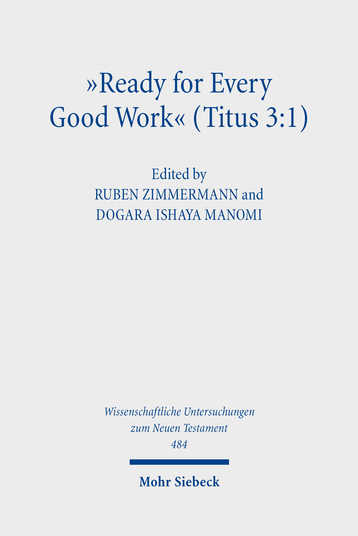Theology
»Ready for Every Good Work« (Titus 3:1)
Implicit Ethics in the Letter to Titus. Kontexte und Normen neutestamentlicher Ethik/Contexts and Norms of New Testament Ethics. Vol. XIII
Edited by Ruben Zimmermann and Dogara Ishaya Manomi
[Rethinking Stereotypes and Rhetorical Gossip towards an Intersectional Ethics of Justice]
139,00 €
including VAT
including VAT
cloth
ISBN 978-3-16-161159-9
available
Also Available As:
Published in English.
No one can deny that the letter to Titus is about ethics and morality. »Good deeds« are mentioned several times, virtue and vice catalogues describe good and bad ways of living, and a household code addresses the different groups in the community. The moral of the letter, however, has been deemed highly problematic because of issues pertaining to gender and the social position of women and slaves, the hierarchy of the leadership in the congregation, and the believer's attitude with respect to society and government. As a result, the letter's ethics have either been heavily criticized, ignored or neglected in scholarship.The present volume explores the ethics in Titus with new methodologies and from different perspectives, including a variety of hermeneutical frames of reading from scholars in different traditions and denominations.
Survey of contents
IntroductionRuben Zimmermann/Dogara Ishaya Manomi: The »Implicit Ethics« in Titus. Introductory Remarks and Summary of the Contributions
I. Linguistic and Rhetorical Aspects of the Implicit Ethics: A Text-immanent Approach
Luke Timothy Johnson: The Pedagogy of Grace. The Experiential Basis of Morality in Titus – Annette Bourland Huizenga: Moral Education in Titus. Antitheses for Ethical Living – Dogara Ishaya Manomi: The Language of Virtue. Discovering Implicit Virtue-Ethical Linguistic Elements in Titus – Rick Brannan: The Language of Ethical Instruction in the Letter to Titus. A View Informed by Discourse Grammar and Speech Act Theory – Jermo van Nes: Moral Language and Ethical Argument in Titus. A Reassessment of the Pseudonymity Hypothesis – Philip H. Towner: The Ethical Agenda of Titus. The Time and Space of Ethics
II. Historical and Contextual Dimensions of the Implicit Ethics: A Socio-historial Approach
Jens Herzer: Ethics, Ethos, and Truth. Reassessing the Question of the Individuality of the Pastoral Epistles – Michael Theobald: Internal Ethos or Ethos before the Public Forum? Titus and His Construct of the Opponents – Ray Van Neste: »Our People«. Ethics and the Identity of the People of God in the Letter to Titus – Harry O. Maier: Ethics and Empire in Titus. Texts, Co-texts, and Contexts
III. The Relevance of the Implicit Ethics: A Hermeneutical Approach
Korinna Zamfir: Women's Vocation and Ministry according to Titus. Ethical Issues and Their Contemporary Relevance – Claire S. Smith: Ethics of Teaching and Learning in Christianity Today. Insights from the Book of Titus – Hans-Ulrich Weidemann: Written to Be with Paul. Reading Galatians with Titus – Marianne Bjelland Kartzow: »Speak evil of no one!« (Titus 3:2).
